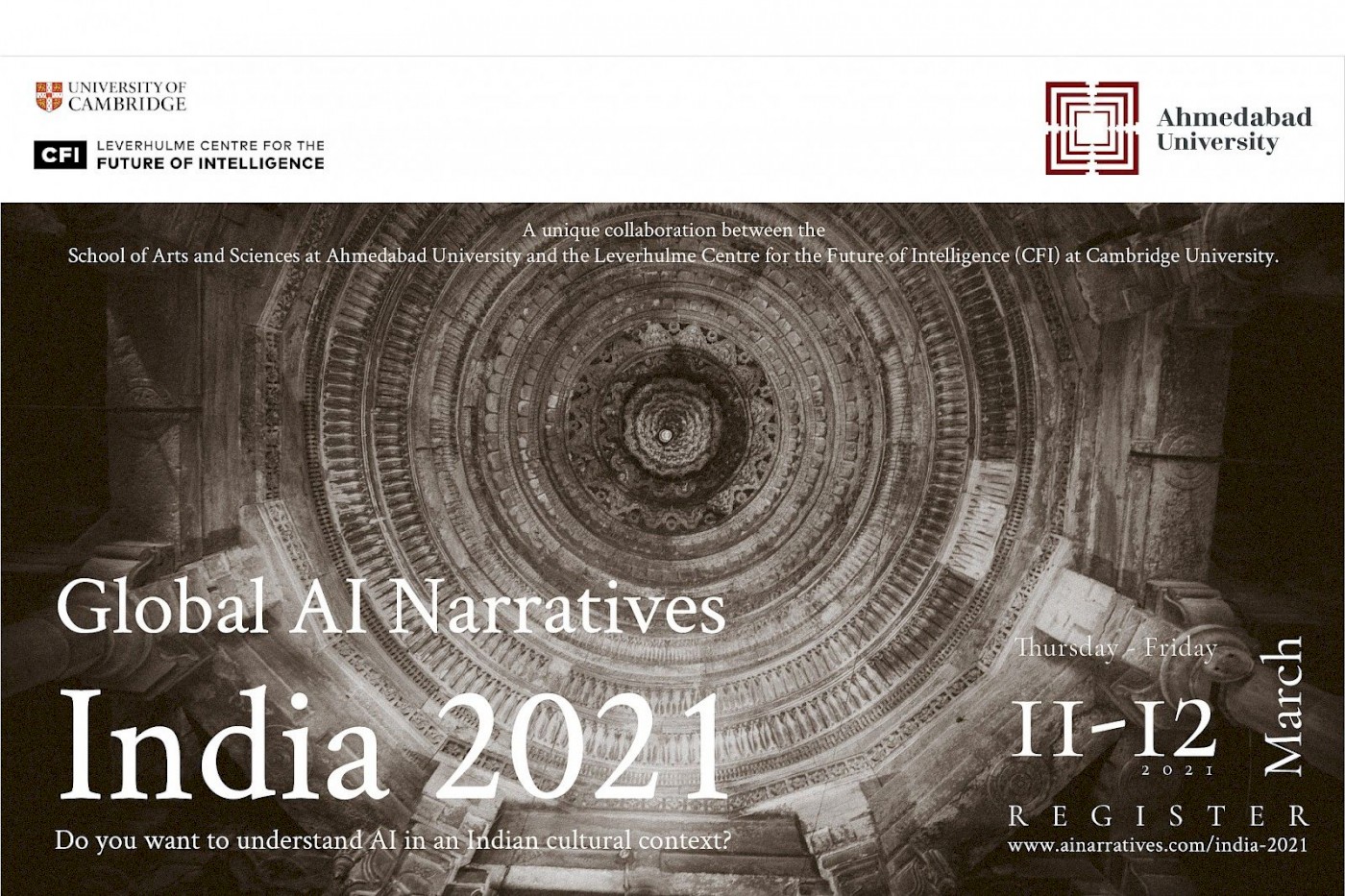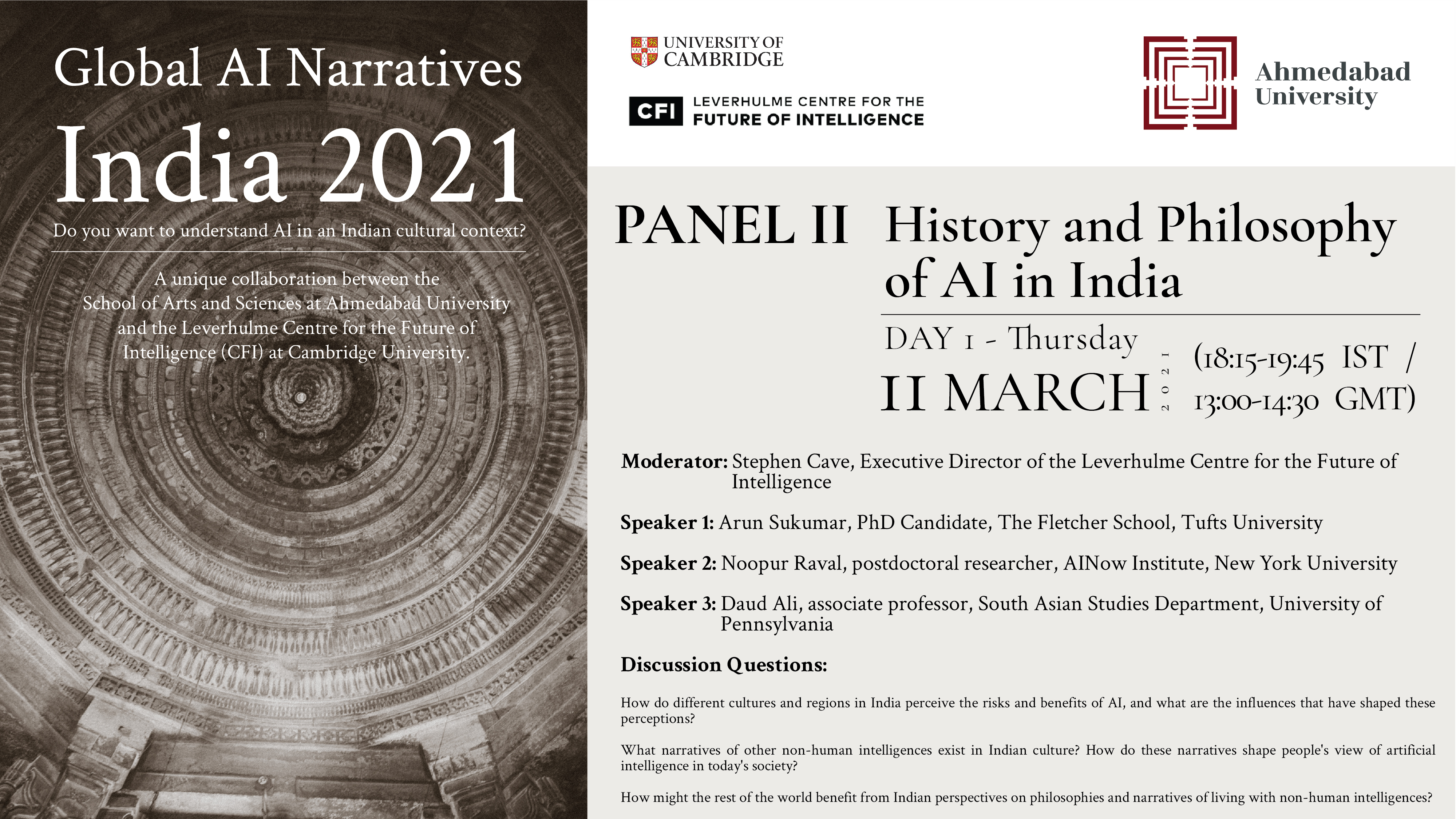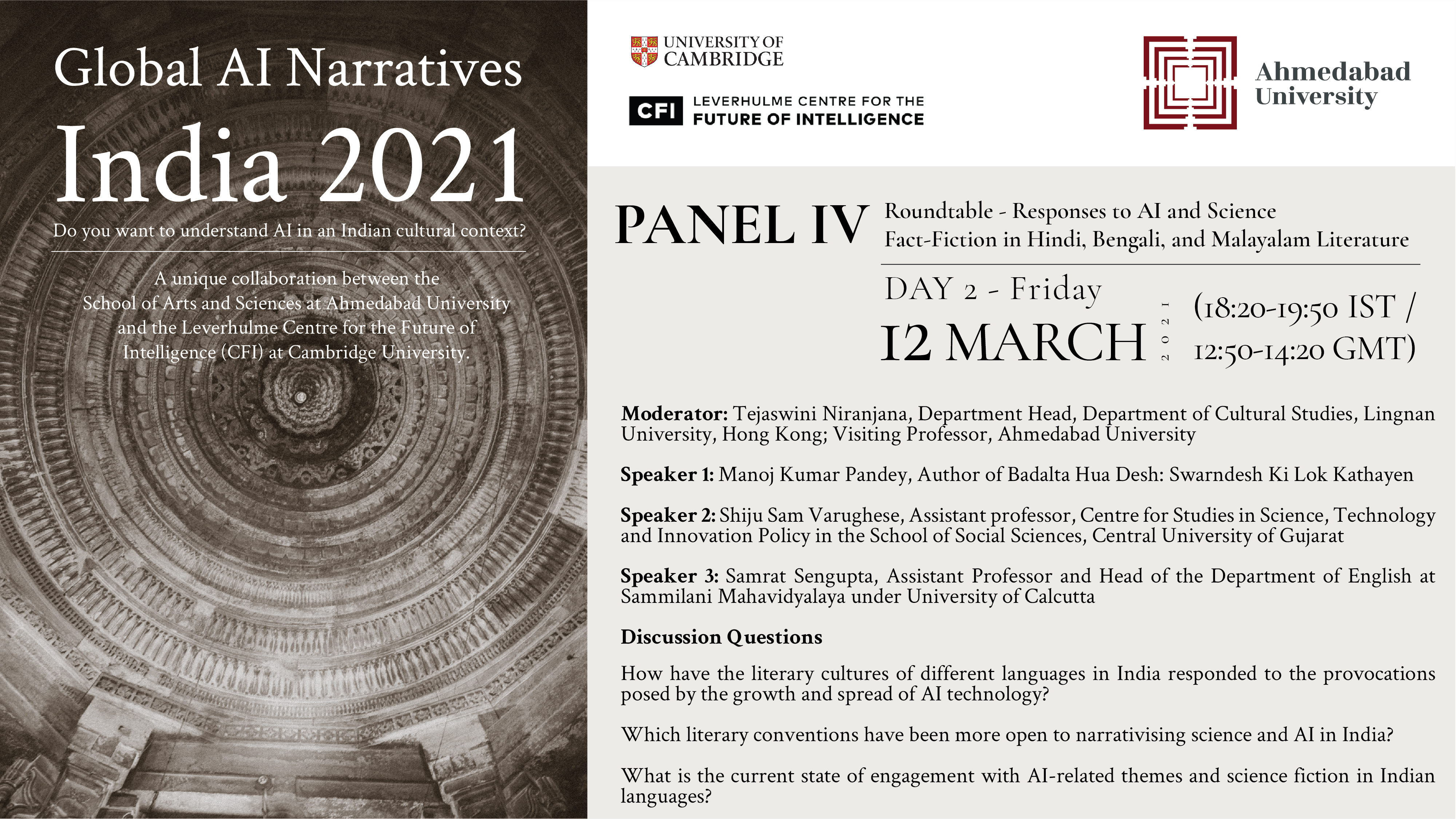Global AI Narratives India

AI Narratives in India
MARCH 11-12, 2021
16:30-20:00 IST / 11:00-14:30 GMT
Platform: Zoom (for a link) | Language: English (with simultaneous translation to Hindi for Panel IV)
A unique collaboration between the School of Arts and Sciences at Ahmedabad University and the Leverhulme Centre for the Future of Intelligence (CFI) at Cambridge University.
Perceptions of Artificial Intelligence (AI) vary across cultural contexts. Narratives, ranging from fiction to non-fiction, play a crucial role in forming ideas and sometimes public policy. Following successful international workshops, the GAIN project at CFI is collaborating with the School of Arts and Sciences at Ahmedabad to understand the history and dissemination of AI narratives in India. The workshop aims to connect scholars, technologists, and artists for collaborative rethinking of the impact of AI in India, South Asia, and globally.
The panels feature:
- AI in Indian Science Fiction and Imagination,
- History and Philosophy of AI Technology in India,
- Conceptual Perspectives on UIDAI and Aadhaar, and
- Responses to AI and Science Fact-Fiction in Hindi, Malayalam, and Bengali Literature.
For speaker bios and details of the organising committee, please Click Here
DAY 1
THURSDAY, MARCH 11
INTRODUCTIONS (16:30-16:45 IST / 11:00-11:15 GMT)
Welcome to the workshop
Patrick French, Dean of School of Arts and Sciences at Ahmedabad University
Welcome to the workshop
Huw Price, emeritus Bertrand Russell Professor of Philosophy, Cambridge University
Introduction to Ahmedabad University and AI in India
Pankaj Chandra, Vice Chancellor, Ahmedabad University
What is CFI and the Global AI Narratives Project
Kanta Dihal, Senior Research Fellow, Project Lead on Global Narratives, Leverhulme Centre for the Future of Intelligence, University of Cambridge.
PANEL I - AI in Indian Science Fiction and Imagination (16:45-18:15 IST / 11:15-12:45 GMT)

Discussion Questions:
- Is there an absence of narratives around artificial intelligence in Indian traditions? If so, what may explain the absence?
- Does Indian science fiction literature link to mythological traditions in India?
- What would make for a uniquely Indian science fiction literature about AI?
Moderator: Kanta Dihal
Speaker 1: Samit Basu, Author of Gameworld Trilogy
Speaker 2: Divya B, Author of Machinehood (pre-recorded conversation)
Speaker 3: Tanuj Solanki, Author of The Machine is Learning
BREAK (18:15-18:30 IST / 12:45-13:00 GMT) (15min)
PANEL II - History and Philosophy of AI in India (18:15-19:45 IST / 13:00-14:30 GMT)

Discussion Questions:
- How do different cultures and regions in India perceive the risks and benefits of AI, and what are the influences that have shaped these perceptions?
- What narratives of other non-human intelligences exist in Indian culture? How do these narratives shape people's view of artificial intelligence in today's society?
- How might the rest of the world benefit from Indian perspectives on philosophies and narratives of living with non-human intelligences?
Moderator: Stephen Cave, Executive Director of the Leverhulme Centre for the Future of Intelligence
Speaker 1: Arun Sukumar, PhD Candidate, The Fletcher School, Tufts University
Speaker 2: Noopur Raval, Postdoctoral Researcher, AINow Institute, New York University
Speaker 3: Daud Ali, Associate Professor, South Asian Studies Department, University of Pennsylvania
CLOSING REMARKS (19:45-19:50)
Patrick French
DAY 2
FRIDAY, MARCH 12
SUMMARY & INTRODUCTIONS (16:30-16:35 IST / 11:00-11:05 GMT)
Kanta Dihal
PANEL III - Conceptual Perspectives on UIDAI and Aadhaar (16:35-18:05 IST / 11:05-12:35 GMT )

Discussion Questions
- How was a biometric-based Identity Management system for India’s 1.3 billion population first conceptualised, designed, and developed?
- How have different groups within the Indian public responded at various stages to the introduction and adoption of the UIDAI system?
- Do public perspectives on Aadhaar influence or align with people’s hopes and fears for AI technologies?
Moderator: Patrick French, Dean of School of Arts and Sciences
Speaker 1: Srikanth Nadhamuni, CEO, Khosla Labs
Speaker 2: Chinmayi Arun, resident fellow of the Information Society Project, Yale Law School
Speaker 3: Ram Sewak Sharma, CEO, National Health Authority; former Chairman, Telecom Regulatory Authority of India (TRAI)
BREAK (18:05-18:20 IST / 12:35-12:50 GMT) (15min)
PANEL IV - Roundtable - Responses to AI and Science Fact-Fiction in Hindi, Bengali, and Malayalam Literature (18:20-19:50 IST / 12:50-14:20 GMT)

Discussion Questions
- How have the literary cultures of different languages in India responded to the provocations posed by the growth and spread of AI technology?
- Which literary conventions have been more open to narrativising science and AI in India?
- What is the current state of engagement with AI-related themes and science fiction in Indian languages?
This Panel will have simultaneous translation to Hindi.
Moderator: Tejaswini Niranjana, Department Head, Department of Cultural Studies, Lingnan University, Hong Kong; Visiting Professor, Ahmedabad University
Speaker 1: Manoj Kumar Pandey, Author of Badalta Hua Desh: Swarndesh Ki Lok Kathayen
Speaker 2: Shiju Sam Varughese, Assistant professor, Centre for Studies in Science, Technology and Innovation Policy in the School of Social Sciences, Central University of Gujarat
Speaker 3: Samrat Sengupta, Assistant Professor and Head of the Department of English at Sammilani Mahavidyalaya under University of Calcutta
CONCLUDING REMARKS (19:50-19:55 IST / 14:20-14:25 GMT)
Kanta Dihal and Patrick French



